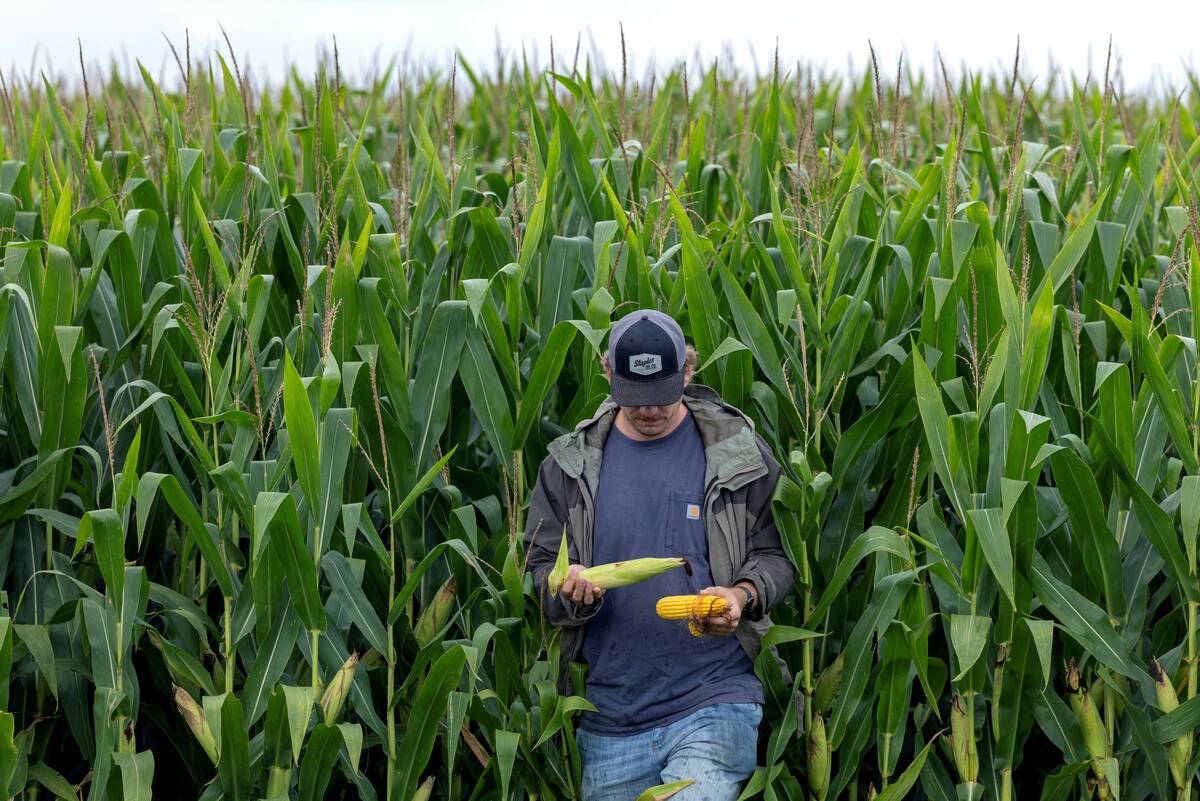A grain elevator just northwest of Winnipeg is the winner in a dispute between Canadian and U.S. railways over the rates charged for handling other railways’ traffic.
The Canadian Transportation Agency (CTA) on Friday shot down an application by Canadian National Railway (CN), which had asked to put a stop to the lower “interswitching” rates paid by U.S. railway BNSF Railway Co. to run traffic on CN lines.
Interswitching rules were set up in Canada as far back as the early 1900s to prevent a tangle of competing rail lines serving manufacturers in urban areas — and to allow shippers to choose their railways at competitive rates without having to build track connecting to that railway alone.
Read Also

The U.S. corn crop could be the biggest ever. That’s terrible news for America’s farmers.
The USDA predicts a record corn crop for U.S. farmers, who question the agency’s accuracy amidst high debt and low crop prices.
Texas-based BNSF owns rail infrastructure in Manitoba dating back to the former Midland Railway Co., now part of a BNSF Canadian subsidiary. In 1912 and 1913, Midland made a running rights agreement and transfer track agreement with CN’s predecessor, Canadian Northern, that allows BNSF traffic on CN lines.
Winnipeg-based Paterson Grain, which owns a grain elevator at Lilyfield, Man., just outside Winnipeg, has direct access to Canadian Pacific Railway (CPR) and also to CN through a running rights agreement with CPR. But BNSF has also interlined with CN on traffic coming out of Paterson at Lilyfield.
CN applied last year to the CTA with a claim that BNSF’s traffic to Paterson is not eligible to be handled under the federal regulations and rates set out for interswitching, and should instead be negotiated in a commercial agreement between the two railways.
But BNSF argued CN should run the U.S. railway’s traffic to Lilyfield under the interswitching rules and rates laid out in the Canada Transportation Act.
Paterson, the Canadian Wheat Board (CWB) and the Manitoba government all got intervener status opposing CN’s application.
According to the CTA’s ruling, CN had claimed that Paterson’s alleged entitlement to regulated interswitching under the 1913 transfer track agreement predates current regulations and “therefore could not have contemplated the provision of interswitching services at regulated rates.”
CN, according to the CTA, was also arguing that it’s not a “local carrier,” as defined in the interswitching rules of the Act, and shouldn’t have to do the “local carrier” work at interswitching rates.
But the CTA ruled Friday that CN’s application would essentially limit the benefits of regulated interswitching to shippers who would otherwise be served by only one railway company. CN’s claim, the CTA wrote, “does not support the principles that regulated interswitching was designed to address.”
The CTA “is of the opinion that for interswitching to apply, a shipper does not have to have access to only one railway company and the requirements of a ‘local carrier’ do not apply to interswitching.”
The agency ruled that BNSF, under the 1913 transfer track agreement, has a line of railway that puts it within the interswitching provisions of the Transportation Act, and that the activities between BNSF and CN in the area are considered interswitching under the Act.
The CWB on Friday said CN’s application, if granted, “would have ended use of a Winnipeg interchange by (BNSF) which has used it for 97 years to transport grain to U.S. markets.”
The CTA’s ruling “ensures that an important competitive element will remain in the U.S. transportation corridor,” the CWB said Friday, adding that it intervened in support of “measures that increase railway competition to encourage reasonable rates and adequate service for farmers.”
CN and BNSF had once entered into a merger agreement, in late 1999, shortly before a U.S. Surface Transportation Board moratorium was imposed on rail mergers. Rather than wait out the 15-month moratorium, CN and BNSF in July 2000 dropped their merger plans and never refiled them.
Service obligations
The CWB on Friday also announced that it has officially filed its papers at the Federal Court of Appeal against another CTA decision in September 2008, in which the agency ruled that CN did not breach its service obligations to farmers in the 2007-08 crop year.
The Federal Court of Appeal in mid-December granted the CWB 60 days’ leave in which to file this appeal, which the board did on Wednesday.
The CTA’s September 2008 ruling had found CN in breach of its level-of-service obligations in 2007-08 to four other grain handling companies, including Paterson, North East Terminal, North West Terminal and Parrish and Heimbecker. But the CTA had ruled CN was not in breach with the CWB nor with a sixth plaintiff, Providence Grain Group.
The CWB, in Wednesday’s appeal filing, “argues that the CTA excluded relevant evidence in dismissing the CWB’s complaint,” the board wrote Friday.
“The CWB also argues that the CTA did not complete its investigation to a point where it was in a position to determine whether CN had breached its service obligations.”















